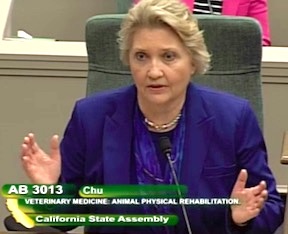Waterhouse

Screenshot from The California Channel
Dr. Cheryl Waterhouse, president of the California Veterinary Medical Board, voiced opposition to Assembly Bill 3013 at Tuesday’s hearing.
AB 3013 would establish training and permitting requirements for physical therapists with a certificate in animal physical rehabilitation and allow them with a veterinarian's referral to work away from the veterinarian's premises.
The committee hearing on the bill drew a crowd balanced between opponents and advocates. Sixteen people speaking in support of the bill included mostly physical therapists and members of the public, several of whom had served last year on a California Veterinary Medical Board (CVMB) Animal Rehabilitation Task Force. That group had recommended the state allow patients referred by a veterinarian to receive rehabilitation therapy by specially trained physical therapists working at an independent location. The CVMB rejected that recommendation. The referral model endorsed by the task force is now the basis for AB 3013, which implicitly rejects the CVMB decision.
Sixteen people testified against the bill, citing concerns over patient safety and consumer protection. Opposition came from the CVMB and California Veterinary Medical Association (CVMA), as well as registered veterinary technicians. One technician suggested considering the inverse proposal — that specially trained veterinarians be allowed to treat human patients — to see the central problem with the bill. “It’s discrediting to our profession,” she said.
Assembly Member Kansen Chu, a Democrat representing the San Jose area, who introduced the bill, told the committee the legislation is driven by a desire to expand opportunity for physical therapists and options for pet owners. “This measure will protect animals and consumers while attracting physical therapists to this growing field, expanding services and choices for animal lovers,” he said.
Before the hearing, AB 3013 was amended in several significant ways, in part to address concerns of the veterinary community.
An earlier provision adding the treatment of animals to the Physical Therapy Practice Act was cut. New provisions include giving the CVMB the authority to discipline physical rehabilitation therapists; and a requirement that referring veterinarians be “available for immediate consultation by telephone or other electronic means if immediate veterinary medical care is necessary.”
Karen Atlas, president of the Animal Physical Therapy Association, which sponsored the bill, said the legislation preserves the veterinarian’s role. “3013 mandates that the veterinarians maintain final control over how animals would receive animal rehabilitation therapy,” she said.
CVMB president Dr. Cheryl Waterhouse wasn’t persuaded by the amendments or promises of control. Moreover, she said, the bill's use of the term “indirect supervision” is not consistent with the definition in CVMB regulations. There, "indirect supervision" happens on the veterinary premises, she explained, and is used in terms of registered veterinary technicians, who can work on certain procedures without a veterinarian present. “This is not indirect supervision,” she said referring to AB 3013. “This is practice by referral.”
Waterhouse offered the 20-year precedent of chiropractors, who she said are required to work under the direct supervision of a veterinarian when performing musculoskeletal manipulation on an animal.
“This bill undermines everything that the Department of Consumer Affairs stands for as far as licensing, regulation and consumer protection," she said. “It undermines the veterinary medicine practice act.”
Because of the highly structured and time-restrictive nature of the hearing, many in attendance had less than a minute to speak, which served to prevent the conversation from getting too heated, despite the fact that there is a lot of history and frustration on both sides. One exchange hinted at these deeper wells of conflict.
The exchange began with a comment by Dr. Janet Van Dyke, a veterinary orthopedic surgeon who supports the expansion of animal physical therapy by veterinarians and physical therapists alike. Van Dyke is the founder and CEO of the Canine Rehabilitation Institute in Florida, which offers training to both professions. She told the legislative committee: “I certainly understand why veterinarians who practice in this field already in California might want to protect their own revenue streams. Several of them are trying to do this by persuading the Legislature to deny physical therapists access to this practice outside of these veterinarians’ own practices.”
Assembly Member Catharine Baker, a Republican representing the San Ramon area, wasn’t having it. “I don’t think that veterinarians who oppose this bill do it because of revenue stream. We should be very careful about folks who say that,” she said. “... [Veterinarians] are professionals and they care about patients.”
Nevertheless, Baker said she believed the amendments addressed veterinarians’ concerns. She, along with eight other members, voted in favor of sending the bill on to the Appropriations Committee. Five other members abstained and two were absent. Appropriations will assess the fiscal impact of the bill. If it passes through that committee, it will go to the full Assembly.